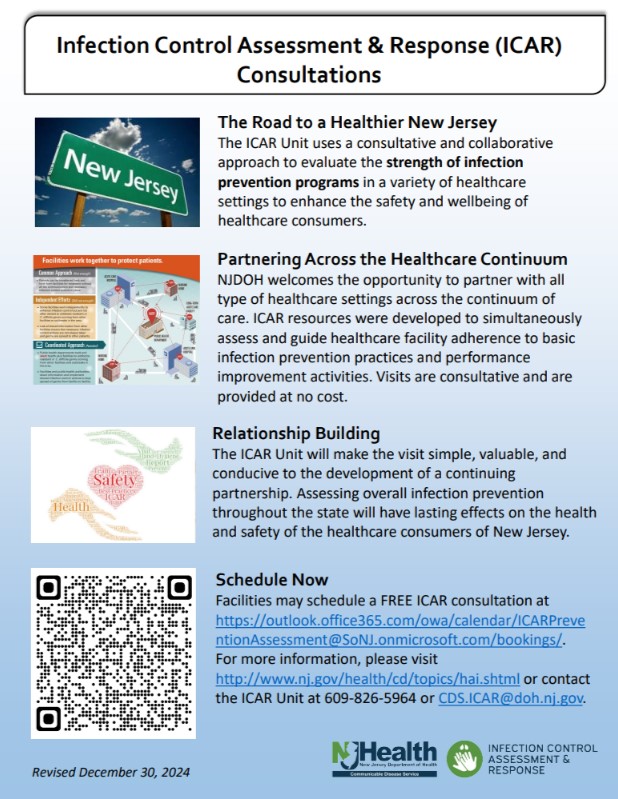
- Home
- Diseases & Health Topics A-Z List
- Healthcare Associated Infections (HAIs) Prevention
Healthcare Associated Infections (HAIs) Prevention
HAIs are infections people can develop as a result of receiving medical care. HAIs can happen in any healthcare facility, including hospitals, ambulatory surgical centers, hemodialysis facilities, and long-term care facilities. A wide variety of bacteria, fungi, viruses, or other, less common pathogens can cause HAIs.
About Us
The ICAR Unit is part of the Infection Control, Healthcare, & Environmental Epidemiology Program within the Communicable Disease Service at the New Jersey Department of Health. The unit comprises subject matter experts specializing in the prevention and containment of HAIs emphasizing patient/resident and healthcare personnel safety and quality improvement. Our subject matter experts include nurses, nurse practitioners, surgical technicians, data analyists, and epidemiologists with a wide range of specialties and expertise, including long-term care, acute care hospitals, hemodialysis, and outpatient settings such as corrections, operating rooms home health, hospice, and pediatrics. This unit provides infection prevention and control-focused assessments and consultation to various healthcare facilities, including acute care, long-term care, hemodialysis, and other outpatient settings.
ICAR Consultations
The ICAR Unit seeks to partner with healthcare facilities of all types to participate in a free, non-regulatory assessment of their infection prevention program and practices. The ICAR Unit offers unique services focused on preventing and containing organisms in healthcare settings. Containment-focused consultations are a targeted approach to disrupt and mitigate transmission during an outbreak. Prevention-focused consultations take a comprehensive approach to enhancing and sustaining infection prevention and control programs, emphasizing patient/resident and healthcare personnel safety and quality improvement within facilities.
During the consultation, the ICAR Unit will:
- Provide infection prevention self-assessment tools and resources
- Facilitate discussions with participants to assess infection prevention practices and program activities
- Detect infection prevention gaps through assessment
- Bolster outbreak preparedness and response
- Coordinate a post-assessment follow-up to provide additional support and resources
Related Links
ICAR Resources
- General Guide to an ICAR Consultation
- Infection Control Assessment and Response (ICAR) Consultations: Frequently Asked Questions
- Infection Prevention and Control & Quality Improvement
Infection Prevention and Control
- Enhanced Barrier Precautions (EBP) in Nursing Homes Algorithm [pdf] NEW 6/10/25
- Blood Glucose Monitoring Audit Tool [pdf]
- Wound Care Audit Tool [pdf]
- Wound Care Competency Checklist [pdf]
- Hand Hygiene Audit Tool [pdf]
- Observational Audit vs. Competency Assessment [pdf]
- Environmental Cleaning Checklist [pdf]
- Caught Red-Handed [pdf]
- Hand Hygiene in Healthcare Settings [pdf]
- Evaluation of Environmental Cleaning using Fluorescent Markers [pdf]

